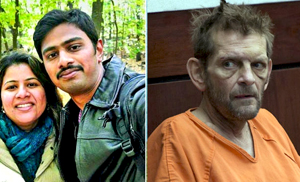Kansas City, Jun 10: A man accused in a bar shooting in suburban Kansas City that left one Indian national dead and another wounded was indicted by a federal grand jury on hate crime charges, the US Justice Department announced Friday.

The indictment against Adam Purinton, 52, of Olathe, Kansas, comes after a February 22 shooting at Austin's Bar and Grill in Olathe, Kansas. Witnesses have said Purinton, who is white, yelled “get out of my country” at two 32-year-old Indian nationals, Srinivas Kuchibhotla and Alok Madasani, before he began shooting. Kuchibhotla died and Madasani was injured. A third man, Ian Grillot, was wounded when he tried to intervene.
The shooting raised fears of more attacks on immigrants following President Donald Trump's election and his call for a ban on immigrants from some countries. Officials in India also expressed concern about their citizens' safety in the US, where many work in technology and other industries.
Kuchibhotla and Madasani had come to the US from India to study and worked as engineers at GPS-maker Garmin.
'I need an answer': Srinivas Kuchibhotla's wife holds press conference |?Full transcript
An affidavit released in March said Madasani told detectives that the gunman asked if their “status was legal” before he opened fire.
The indictment announced Friday alleges Purinton shot the two Indian men because of their “actual and perceived” race, colour, religion and national origin. The indictment also alleges Purinton committed the crimes after premeditation and planning, attempted to kill more than one person and created a grave risk of death to others at the scene. The indictment also accuses Purinton of violating federal firearms laws.
After the shooting, Purinton drove 70 miles east to an Applebee's restaurant in Clinton, Missouri, where he allegedly admitted the shootings to a bartender, who called police.
The Justice Department said in a news release Friday that it would determine later whether Purinton should face the death penalty.
Purinton was a Navy veteran who was a regular customer at Austin's. Neighbours in the quiet Olathe cul-de-sac where he lived told The Associated Press that Purinton had become “a drunken mess” after his father's death about two years ago and had physically and mentally deteriorated before the shooting.
Olathe Mayor Michael Copeland said in a statement that the hate crime charge was appropriate.
“The intent of this one act was to spread hate. It failed miserably,” Copeland said. “It has spread love, and it has brought this community even closer together.”
Police Chief Steve Menke said he hoped the charges would bring some comfort to Kuchibhotla' loved ones and friends and to the survivors of the shooting.
Purinton is jailed in Johnson County, Kansas, on $2 million bond on murder and attempted murder charges.
His public defender, Michael McCulloch, did not immediately return a message seeking comment.
Grillot, who was hospitalised for 10 days after the shooting, was honored by Indian dignitaries for his efforts to stop the shooting. Three officials from the Consulate General of India in Houston traveled to Kansas City to meet Grillot in the days after the shooting. Consul General Anupam Ray told Grillot that his bravery was more representative of America than the violence at Austins, the hospital said.
In March, Grillot received a $100,000 check at a gala in Houston from The India House and three donors, with the money to be used toward buying a house.
A message left Friday with the Consul General's office was not immediately returned. A message to the Indian Embassy in Washington DC also was not immediately returned.






Comments
Add new comment